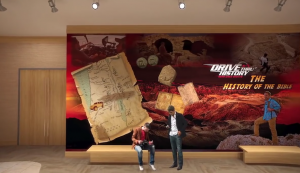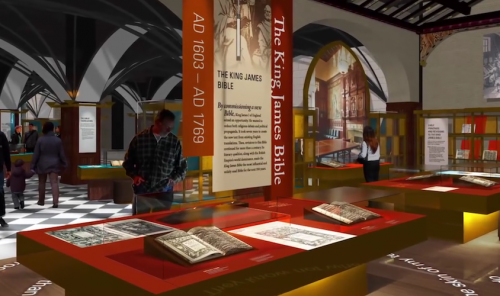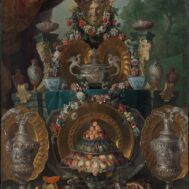November marked the opening of both the Louvre Abu Dhabi in the United Arab Emirates and a Museum of the Bible in Washington, DC. Like everything else in Washington, the museum opening has political overtones. North Carolina’s Representative Robert Pittenger introduced a concurrent resolution in Congress on its opening day, recognizing the opening of the museum, and citing the Christian Bible’s special significance in the history of the United States. The resolution has 35 co-sponsors as of this writing. The opening followed a black tie gala at the Trump International Hotel the previous evening.
The $500 million Museum of the Bible sits just three blocks from the nation’s capitol. The 430,000 square foot, privately owned museum houses one of the largest collections of Bible related artifacts in the world. Formed in 2010 as a public charity, the museum made Forbes’ list of 100 largest nonprofits in the United States before it even opened its doors.
The statements of purpose of the Abu Dhabi and American museums form a striking comparison; the UAE museum gives equal place to great artworks from all cultures, across time and around the world; one of its stated goals is to bridge civilizations and ease tension in the Middle East, and to counter the “radicalization of groups that have kidnapped Islam.”

Museum of the Bible, Drive-thru History
The Museum of the Bible asks all people to “engage with the Bible” by showing the depth and breadth of its influence. Despite the inclusion of some other approaches to Christianity and a bow to Judaic tradition, these exhibits have a bit of the feel of an “honorable mention” about them. The museum also seems designed to stun and amaze its visitors with technologically advanced displays. It features a virtual “flyby” in the exhibit Washington Revelations that highlights the areas around the capital where Biblical passages are cited or quoted. The museum also has an innovative digital guide for ease of navigation and planning. The World Stage Theater utilizes a digital 3-D mapping technique that allows the production to unfold around the audience.
The museum’s permanent collection primarily comes from the 40,000 piece Green Collection; artifacts, art, and manuscripts, spanning centuries, all related to the bible. The museum website notes that the Green collection is “complimented” by loans from over 41 institutions, including a substantial, long-term loan from the Israel Antiquities Authority’s collection of over two million artifacts (reflecting Jewish biblical heritage) and another long-term loan exhibition featuring items from the Vatican library and museums (representing the Catholic faith).
The special exhibits currently on display at the museum include:
- a simulated walk in an excavated site looking over the Valley of Elah,
- illustrated Christmas stories from the Bavarian State Library collection,
- a tribute to the song Amazing Grace, written in 1779 by the English poet and Anglican clergyman John Newton (1725–1807),
- early modern depictions of the book of Ecclesiastes,
- the biblically influenced contemporary art of Makoto Fujimura,
- books from two of Amsterdam’s Jewish libraries, and
- sculptural representations of the stations of the cross.
Much of the museum’s exhibits are geared toward demonstrating the impact of the Bible on world and national history, from the ancient past to the modern day. The biblical focus is carried through the museum, even in the rooftop garden, which features a ‘tree of life’ and plants significant to the Bible’s narrative.
Although the museum has attempted not to set a hard line between literal and non-literal interpretations of the Bible, and has incorporated Protestant, Jewish, and Catholic perspectives within its exhibitions, it has been criticized for not specifically acknowledging the foundations of Islamic teachings in the Old Testament or dealing with other religious teachings such as Mormonism.
The Museum of the Bible is a private museum, primarily funded by the evangelical Christian Green family, owners of the arts and craft chain store Hobby Lobby. The store made headlines over the last few years, first by winning the US Supreme Court case, Burwell vs. Hobby Lobby, and secondly for illegally importing Iraqi artifacts.
The decision in the 2014 Supreme Court case allows for “closely held, for-profit corporations to be exempt from a regulation its owners religiously object to.” Hobby Lobby objected, on religious grounds, to certain types of birth control that were covered under the Affordable Care Act.
In 2011 US Customs seized a shipment of cuneiform tablets, labeled as “handcrafted clay tiles,” which were imported by Hobby Lobby. Asserting that it was unaware of importation laws, Hobby Lobby settled in 2017, paying a three million dollar fine and returning the artifacts to Iraq. In a press release following the settlement, the Museum of the Bible stated, “We have been made aware of the settlement between Hobby Lobby and the government. The Museum of the Bible was not a party to either the investigation or the settlement. None of the artifacts identified in the settlement are part of the Museum’s collection, nor have they ever been. The Museum adheres to the current Association of Art Museum Directors standards on the Acquisition of Archaeological Material and Ancient Art, as well as guidelines set forth by the American Alliance of Museums. We remain on track to open in November and look forward to sharing our exhibits and displays with the public.”
On September 17, 2017, the museum engaged Thomas R. Kline, an attorney with Cultural Heritage Partners, to advise the board on matters of compliance with cultural property laws, governance and museum operations.
 Museum of the Bible, King James Bible exhibition. Courtesy MOTB.
Museum of the Bible, King James Bible exhibition. Courtesy MOTB. 

